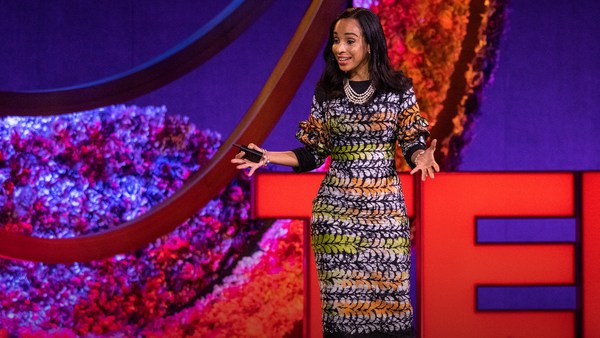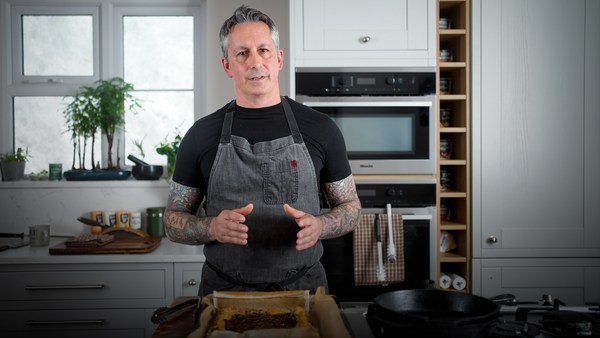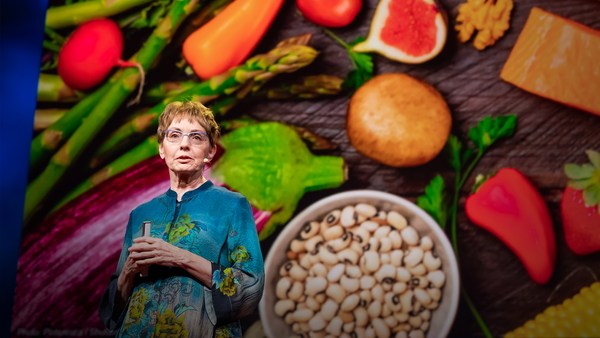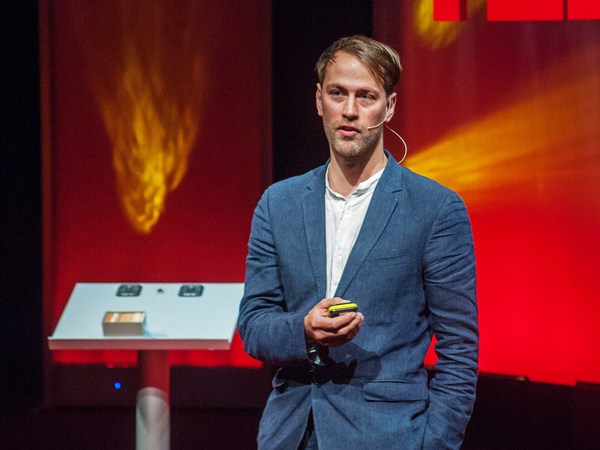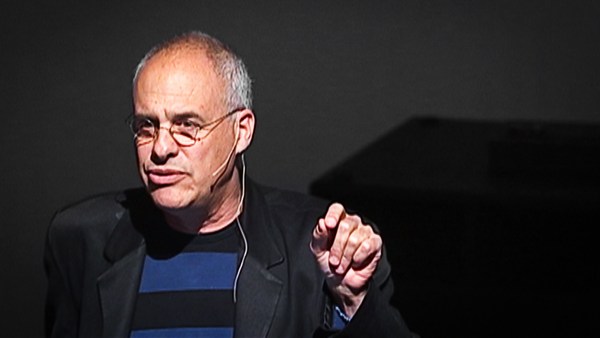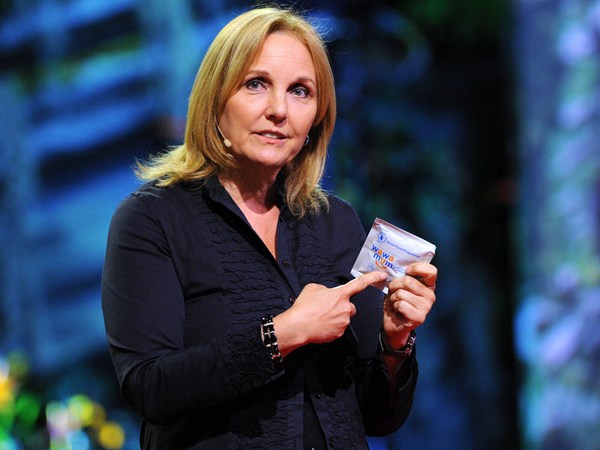If a vegan falls in the forest ...
(Laughter)
And no one's there to hear them say, "I'm vegan!"
(Laughter)
Are they even really vegan?
(Laughter)
(Laughter and applause)
I like to preface conversations about my dietary habits with jokes because brains love the ha-has and because sometimes you say the word "vegan" and people get a little afraid. Their mind immediately conjures this nonexistent super vegan who's an amalgam of every annoying thing they've ever heard a vegan say.
(Laughter)
And at that point, they're checked out. Now if you've managed to somehow avoid the zeitgeist for the last 15 or 20 years, one, tell me how.
(Laughter)
Two, I will tell you what vegan means, because I'm sure you're dying to know. So vegan is both a diet completely free of animal products and a person who follows that diet, often used interchangeably with "plant-based." But plant-based means "vegan" but not vegan.
(Laughter)
Like, not necessarily done to decrease animal suffering per se, but maybe to help one's health. But that is not the argument we came to have today. No siree, Bob.
(Laughter)
I see some sweet-spot minds looking to tussle. Not at my TED Talk.
(Laughter)
Now I am an outdoor educator, I am a wild food forager, I am a reluctant social media star.
(Laughter)
And yes, I am a vegan.
Audience: Whoo!
Thank you. That's not the reaction I usually get.
(Laughter)
At the age of five, upon realizing that the cows in the fields and the cows on my dad's grill were the same cows ...
(Laughter)
I asked my parents if I could go vegetarian. To which they said, "Sure, but let's wait until you're done growing first." So sure that I would change my mind over the next five to nine years. Well. Shortly after my 12th birthday, I took the plunge, and I gave up meat completely. It took another 12 years for me to give up eggs and dairy. And now between the veganism and the foraging, I have one of the more eclectic pantries in the world.
(Video) Meet the Indigo Milk Cap. Let's make a fancy dessert out of seaweed. Here is a mimosa tree. Please be a puffball! Please be a puffball!
(Laughter)
It was a puffball. Now, foraging is the art/science of identifying, collecting and eating wild food. So if anyone's ever convinced you to try dandelions or wood sorrel, congratulations, you're a forager too. When my mom told me that there was a bunch of free food hanging out in lawns and sidewalks ...
(Laughter)
my mind was blown. All these free fruits, veggies and fungi that didn't require your water, didn’t require your time and often were healthier than their counterparts in the grocery store. Cute little fun fact just between us, we did this thing over the last 100 years where we bred foods to travel easier, be bigger, taste milder. And that often breeds out the nutrition. Let's take, for example, Purslane or Verdolagas, if you are in a Spanish-speaking part of the Americas. It is a weed that grows out of sidewalk cracks in the summertime. It is chock-full of Omega-3s, and it ain’t a fish. Iron, get out of here, Popeye.
(Laughter)
And vitamin C, your immune system will thank you. Sometimes I will just stand in my neighborhood, looking at the ground like.
(Laughter)
And I'm baffled that no one else seems to care.
Now I am a forager and a vegan for much the same reason. My love of this planet and its inhabitants. But let me tell you, between those two identifiers, it's pretty hard to get people to try my food.
(Laughter)
You tell someone something's vegan and you're already met with skepticism. Tell them it’s vegan and you pulled half of it out of the ground ...
(Laughter)
It's a tough sell. So today I'm going to give all of you my tips, my tricks on getting people to expand their palette and try wild vegan foods consensually.
(Laughter)
This is not the Lying Liar show. It is the Slightly Annoying but Ultimately Lovable Tall Vegan show.
(Laughter)
So today we are going to be making a snack that happens to be vegan, happens to be great for the planet, happens to use one of my favorite ingredients. We are making sweet and salty kelp chips, a Korean snack known as Dasima Twigak. Oh, thank you. A "woo" for the pronunciation, I was worried about it.
(Laughter)
Now I know all of y'all's kids are obsessed with those nori seaweed snacks, so why not kick it up a notch -- Sorry --
(Laughter)
With a locally foraged ingredient: bull kelp. I foraged this right here in Vancouver.
(Applause and cheers)
Now I'm going to go and start chipifying this seaweed. Very official kitchen shears. And while I'm doing that, I'm going to give you my first tip. When introducing a dish to skeptical mouths, it is best to use a dish that is not pretending to be something else.
(Applause)
You know.
That way, they have no prior associations, no memories to be comparing it to of their mother's version of it.
(Laughter)
Maybe they have no opinions about it at all. I'm going to spritz these with a little sunflower oil. Ooh. Smokey. Now, seaweed and sea vegetables in general are a very exciting food space. They don't require fresh water. They don't require fertilizer. They don't even require land. They're just hanging out in the salty seas, creating ecosystems, creating oxygen for all of us to breathe, and creating these amino acid-rich snacks. In this day and age, seaweed is truly future-minded food. They're an option I wish more people would reach for, as runoff, water access, labor issues and monoculturing plague a lot of modern agriculture here in North America. Yeah.
(Applause)
Also they taste real good. Those amino acids do a lot more than adding umami to your dishes. Bull help on average packs 15.3 percent protein by weight. That is for everyone who asks where vegans get their protein from. We're fine.
(Laughter)
Now as I said before, this dish is nothing new. It's a popular bar snack in parts of Korea, and we actually have a lot of accidentally vegan recipes historically. And the reason for that is because up until recently, we did not eat this much meat.
Which is going to lead to my second tip. It's a little spicy, a little touchy. Hopefully the promise of a food reveal will get you all through it. And it is this. Explain to your friends that the way that we are eating is not sustainable. Yeah.
(Applause)
It's not.
(Applause)
As we are constantly reaching for more land and more fresh water, we have set a precedent that our planet can not keep up with. Tell them you are not trying to change their entire life. You just want them to be a bit more thoughtful with some of their choices, to go for those kelp chips instead of maybe pork rinds from the convenience store. I find that introducing people to wild foods in their area is an excellent way to foster their connection to their food. And it's a way that fosters that connection over shame. And it shares a snack instead of an infographic or a shocking piece of media.
Now moment of truth time. Let's see how these guys are doing in here. Oh, yes, this will do nicely. Now I'm going to be real real with all of you because I would never not be real real with you. Some people ... OK, get out of there, babies.
(Laughter)
Some people are going to be salty. And that's a funny thing for me to say, because this is salt.
(Laughter)
And that's just the way it goes, we don't get to choose the pace at which people change, if they choose to change at all. But, some people -- this is sugar -- will be sweet. They will appreciate you for meeting them where they are. For sharing a snack and a smile, and maybe you extending that bit of compassion to them will make them make some big changes moving forward in their life. And who knows, maybe next time they'll be gutsy enough to try acorn cheese or something.
So share that snack. And make that memory. Thank you all so much for coming to my talk. Ooh. That was a nice crunch. Happy snacking. Don't die.
(Cheers and applause)
